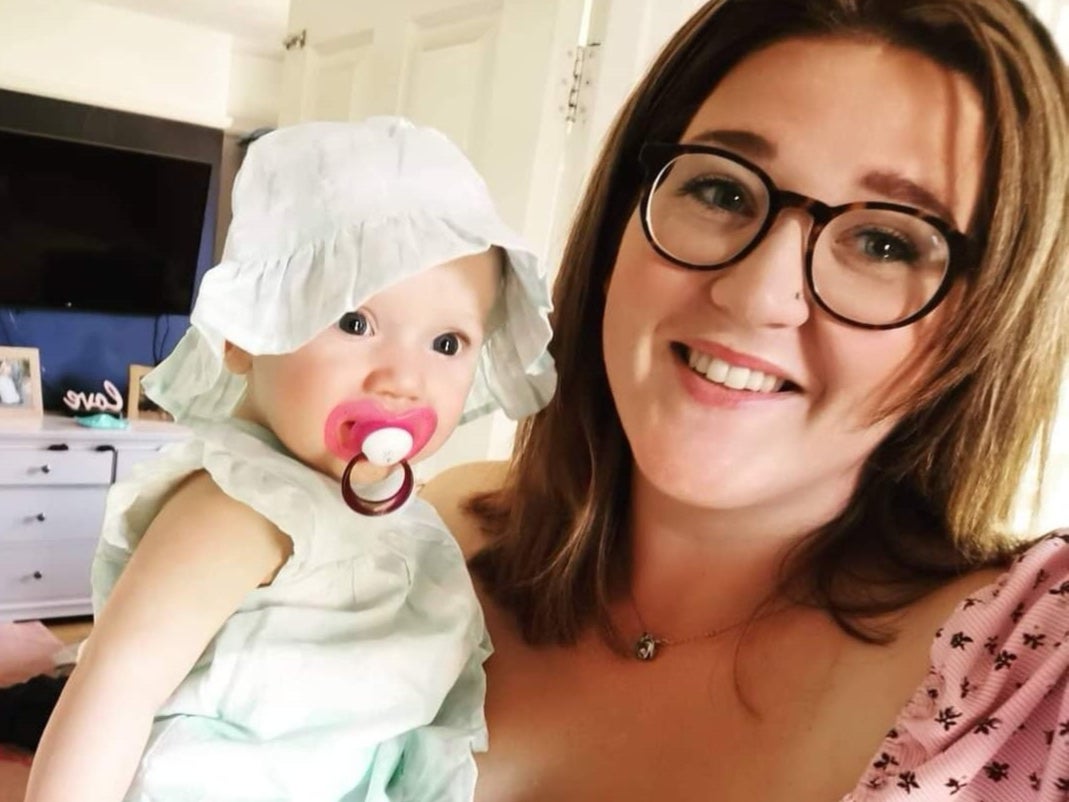Mother says she was left with ‘life-changing’ blood clot after taking contraceptive pill
Exclusive: ‘Luckily my mum had a blood clot and advocated for me, otherwise I probably wouldn’t be here today,’ says Jess Seaton

Your support helps us to tell the story
From reproductive rights to climate change to Big Tech, The Independent is on the ground when the story is developing. Whether it's investigating the financials of Elon Musk's pro-Trump PAC or producing our latest documentary, 'The A Word', which shines a light on the American women fighting for reproductive rights, we know how important it is to parse out the facts from the messaging.
At such a critical moment in US history, we need reporters on the ground. Your donation allows us to keep sending journalists to speak to both sides of the story.
The Independent is trusted by Americans across the entire political spectrum. And unlike many other quality news outlets, we choose not to lock Americans out of our reporting and analysis with paywalls. We believe quality journalism should be available to everyone, paid for by those who can afford it.
Your support makes all the difference.A young woman has urged the NHS to provide blood tests for women before prescribing the contraceptive pill after she was left with a “life-changing” blood clot that almost killed her.
Combined hormonal contraceptives are highly safe for most women but can put them at risk of suffering a heart attack or stroke, as well as placing them at a small heightened risk of deep vein thrombosis which involves developing a blood clot and can be fatal.
Speaking to The Independent, Jess Seaton said the blood clot had left her with long-term health issues which included using a crutch to walk for many years and developing post-traumatic stress disorder.
Recounting her experience for the first time, the 25-year-old, who lives in the Isle of Wight, explained how she was prescribed the combined pill after going to her GP practice at the age of 15 in January 2012. Her mother accompanied her as she wanted to inform the doctor of a family medical history of blood-clotting disorders.
Ms Seaton, who now has two children, explained how she was prescribed the combined contraceptive pill despite the fact these health issues were clearly flagged to the nurse – with the health professional assuring her they would keep tabs on her blood pressure and she would “be fine”.
“Because of my age they were more concerned about underage pregnancies rather than my safety,” said Ms Seaton.
She was forced to go to accident and emergency after developing severe leg pain and swelling during October of that year.
Once she was in A&E, she was diagnosed with a gigantic blood clot that stretched from her ankle to her belly button, she recalled, adding that doctors told her they had never seen such a large clot in such a young person.
Ms Seaton said: “The visible symptoms on the outside were a purple, mottled leg. It can be very hot, which mine was. There was excruciating pain which was sharp and stabbing. The day that it all kicked off, I didn’t realise what it was.
“A walk which usually took two minutes took 30 minutes because I had to keep stopping and starting. Luckily my mum had a blood clot and advocated for me, otherwise I probably wouldn’t be here today.”
Ms Seaton explained how she underwent an emergency operation to have the clot removed which lasted three-and-a-half hours at Southampton Hospital – saying it was this experience which gave her post-traumatic stress disorder.
“I was awake for the whole time. We got told the anaesthetist would not be able to come for another two weeks and if we waited then I would die,” she said.
“I had local anaesthetic but I felt everything. They were pulling veins out of the keyhole. I was getting more and more worked up so my oxygen levels went down. I was screaming and crying asking them to stop.”
She said she now suffers from post-thrombotic syndrome, which some people get after suffering blood clots – adding that this causes pain and swelling in her limbs. The leg where she had the clot will always measure bigger than the other and it feels painful when she is sitting down or standing up, she added.
Ms Seaton said: “I can exercise but I’ll probably be in bed because I can’t move afterwards. I wanted to be a social worker but was in too much pain to do it – sometimes I wake up and my leg thinks: ‘No you’re not moving’.
“I definitely feel angry because of the surgery. I have flashbacks of the operation. I had to work a lot with a therapist to even try to go into a hospital – I’d just run away. It definitely contributed to anxiety and depression.”
Jess should have been prescribed another form of contraception in view of her family history.
She said the ordeal has been “life-changing”, resulting in her losing out on her teenage years. She is planning to start a campaign to demand that the NHS gives women blood tests before they are put on any type of contraceptive pill.
Ms Seaton added: “Everyone has white coat syndrome and trusts everything that comes out of doctors and nurses’ mouths.”
The risk of a blood clot in people using a combined hormonal contraceptive is three times higher than the risk in those who do not take it, according to the Faculty of Sexual and Reproductive Health.
Caroline Moore, a lawyer who supported Ms Seaton, said: “Jess was let down in her medical care, as the nurse who prescribed the pill failed to act on the information she was given.
“Jess should have been prescribed another form of contraception, in view of her family history. As it is, she’s been robbed of some of the key years of her life and left with residual symptoms that will affect her forever. It is a shame that presently, blood tests to identify clotting disorders are not routine before prescription of the pill.”
Ms Moore said she represented Ms Seaton in a medical negligence claim which she won and received a large sum in compensation.
Ms Moore, who is managing partner of Medical Solicitors, a law firm based in Sheffield, said that while she does not know for sure, she suspects that the nurse Ms Seaton saw adopted a “paternalistic approach to contraception for a 15-year-old”.
“And [she] didn’t trust Jess to take the minipill each day and therefore chose the full combined contraceptive pill which was entirely inappropriate, given the family history,” she added.
A representative of University Hospital Southampton said: “We are not familiar with what has been reported and would encourage the patient to contact us via our patient support service so that we can look into this matter.”
Dr Alison Cave, a chief safety officer at the Medicines and Healthcare products Regulatory Agency, said they closely review the safety of all medicines to make sure “benefits outweigh any risks”.
She added: “The safety of the public is our top priority. The risk of blood clots associated with using the combined contraceptive pill is very small but has been known about for many years.
“The decision to prescribe or use the pill should take into consideration any risk factors for blood clots, which includes any family history of thrombosis.
“Prescribers and pill users should familiarise themselves with the major risk factors for blood clots and the key signs and symptoms of these, which are provided in the product information and in the additional risk materials provided for these products.“
Dr Cave said they advise that hormonal contraceptive pills are “highly effective for preventing unwanted pregnancy and the benefits associated with their use outweigh the risks for most people.“
But she urged anyone who has worries about the risks linked with their hormonal contraceptive to talk to their GP or contraceptive provider but carry on taking their contraception until they have talked to them.
“Suddenly stopping a combined hormonal contraceptive may result in accidental pregnancy,” Dr Cave added. “If you suspect any side effect, please report it to us using the Yellow Card scheme website”.
Subscribe to Independent Premium to bookmark this article
Want to bookmark your favourite articles and stories to read or reference later? Start your Independent Premium subscription today.




Join our commenting forum
Join thought-provoking conversations, follow other Independent readers and see their replies
Comments